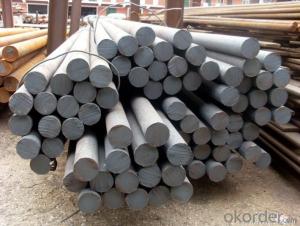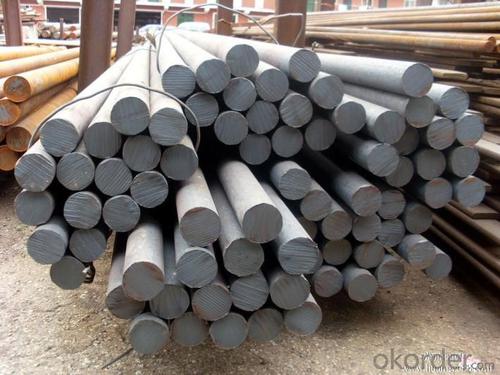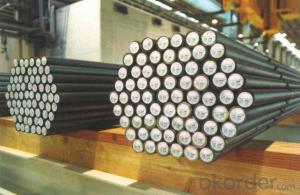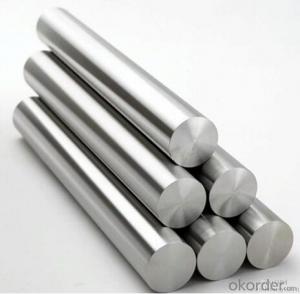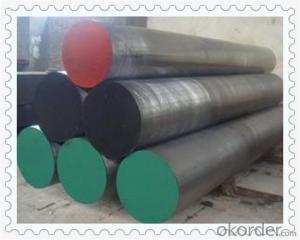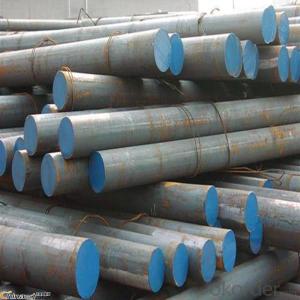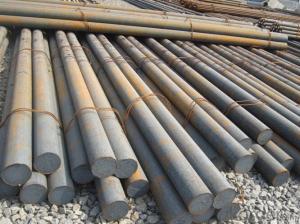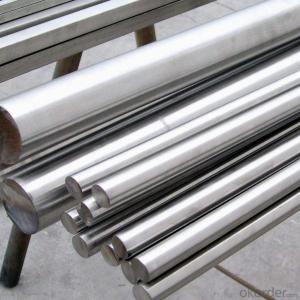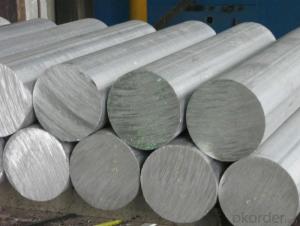SAE1045 4140 4340 8620 8640 Alloy Steel Bar
- Loading Port:
- China main port
- Payment Terms:
- TT or LC
- Min Order Qty:
- 25 m.t.
- Supply Capability:
- 10000 m.t./month
OKorder Service Pledge
OKorder Financial Service
You Might Also Like
Specification
The details of our Steel
1. Produce Standard: as the GB, AISI, ASTM, SAE, EN, BS, DIN, JIS Industry Standard
2. Produce processes: Smelt Iron -EAF smelt Billet - ESR smelt Billet -Hot rolled or forged get the steel round bar and plate
3. Heat treatment:Normalized / Annealed / Quenched+Tempered
4. Quality assurance:
All order we can received Third party inspection, You can let SGS, BV,.. and others test company test and inspect our products before Goods shipping.
Product information
Specification of S45C steel | |||
Round bar | Diameter(mm) | Length (mm) | |
100~300 | 2000~5800 | ||
Plate | Thickness(mm) | Width (mm) | Length (mm) |
20~70 | 105~610 | 2000~5800 | |
The specification can be customised! | |||
Heat treatment
1.Quench:1000-1040`C via 600`C and 850`C, preheating oil or wind cooling
2.Temper temperature should be higher than working temperature in order to stabilize the working size of mold
3.Heat up to 650°C of average temperature in order to eliminate the machined stress, 500 °c air cooling after electric cooker cooling
4.Tempering, 800-850 °c ,slow cooling after diathermia
5. Melting Process of SKD61 steel rod
Product show

Workshop show

- Q: How does special steel perform in power generation applications?
- Special steel is highly regarded in power generation applications due to its exceptional strength, resistance to corrosion, and ability to withstand high temperatures. These qualities make it ideal for the construction of critical components such as turbine blades, steam generators, and boiler tubes. Special steel's superior performance ensures efficient and reliable power generation, contributing to increased productivity and longevity of power plants.
- Q: How does special steel contribute to the performance of cutting tools?
- Special steel contributes to the performance of cutting tools in several ways. Firstly, it offers exceptional hardness and strength, enabling the cutting tool to withstand the high forces and pressures encountered during cutting. This durability ensures that the tool remains sharp for longer periods, reducing the need for frequent replacements. Additionally, special steel also possesses excellent heat resistance, preventing the tool from overheating and maintaining its cutting ability. Moreover, special steel can have specific alloying elements that enhance wear resistance, corrosion resistance, and toughness, further improving the performance and lifespan of cutting tools. Overall, the use of special steel in cutting tools enhances their efficiency, reliability, and longevity, resulting in improved cutting precision and reduced downtime.
- Q: How is heat-resistant steel used in high-temperature applications?
- Heat-resistant steel is used in high-temperature applications due to its ability to withstand elevated temperatures without losing its structural integrity. This type of steel is commonly used in industries such as aerospace, power generation, and petrochemicals, where it is essential to maintain the strength and performance of components exposed to extreme heat. Heat-resistant steel is used in the construction of furnaces, boilers, heat exchangers, and other equipment that operate under high temperatures, ensuring their reliability and longevity even in challenging environments.
- Q: What are the common challenges in machining titanium alloys?
- Successful and efficient results in machining titanium alloys require addressing several common challenges. One primary challenge is the inherent strength and hardness of the material. Titanium alloys are renowned for their excellent strength-to-weight ratio, making them ideal for various applications. However, this same strength makes them difficult to machine. The high strength of titanium alloys increases the cutting forces needed during machining, resulting in faster tool wear and reduced tool life. This necessitates the use of robust cutting tools made from carbide or ceramic, capable of withstanding demanding conditions and maintaining cutting performance. Another challenge in machining titanium alloys is their poor thermal conductivity. This characteristic leads to rapid heat buildup during cutting, causing localized high temperatures. These high temperatures can cause thermal damage to both the cutting tool and the workpiece, reducing dimensional accuracy and surface finish. To overcome this challenge, implementing effective cooling and lubrication techniques, such as using coolant or high-pressure air, is crucial to dissipate heat and prevent overheating. Furthermore, machining titanium alloys often results in the generation of built-up edge (BUE). BUE refers to the accumulation of workpiece material on the cutting tool, leading to poor chip evacuation, increased cutting forces, and surface finish issues. To mitigate BUE formation, it is recommended to use appropriate cutting speeds and feed rates, as well as cutting fluids that aid in chip evacuation and prevent material adhesion on the tool. Additionally, titanium alloys react strongly with oxygen, causing the formation of a stubborn oxide layer on the surface during machining. This oxide layer can cause tool chipping and premature wear. To combat this, it is necessary to employ suitable cutting speeds and feeds that efficiently remove material while minimizing prolonged exposure to the reactive nature of titanium alloys. Lastly, the low thermal expansion coefficient of titanium alloys can result in workpiece distortion and dimensional inaccuracies. To address this challenge, it is important to ensure proper fixturing and clamping techniques that minimize workpiece movement during machining. In conclusion, machining titanium alloys presents challenges such as high cutting forces, poor thermal conductivity, built-up edge formation, reactive oxide layer, and workpiece distortion. These challenges can be overcome by using appropriate cutting tools, effective cooling and lubrication techniques, proper cutting parameters, and careful workpiece handling.
- Q: How does special steel contribute to the manufacturing of springs?
- Special steel contributes to the manufacturing of springs by providing specific mechanical properties that are crucial for their functionality. The unique composition and heat treatment of special steel ensure excellent strength, durability, and elasticity, allowing springs to efficiently store and release energy. Additionally, special steel's resistance to corrosion and fatigue enhances the lifespan and reliability of springs, making them suitable for various applications in industries such as automotive, aerospace, and machinery.
- Q: How does special steel perform in high-temperature creep?
- Special steel has been specifically engineered to excel in conditions of high-temperature creep. Creep refers to the material's inclination to deform over time under consistent stress at elevated temperatures. Due to its unique composition and heat treatment procedures, special steel demonstrates exceptional resistance to creep. The alloying elements, including chromium, nickel, and molybdenum, significantly enhance its strength at high temperatures and its ability to resist creep. These elements create stable carbides and enhance the material's capacity to maintain its structural integrity even when exposed to elevated temperatures. Additionally, special steel often undergoes specific heat treatment methods, such as annealing or quenching and tempering, to further improve its resistance to creep. These processes refine the steel's microstructure, reduce internal stresses, and enhance its overall mechanical properties. The combination of alloying elements and heat treatment processes endows special steel with exceptional resistance to creep. It can endure prolonged exposure to high temperatures without significant deformation or failure. This makes special steel an ideal choice for applications involving high-temperature and high-stress conditions, such as gas turbines, petrochemical plants, and power generation facilities. In conclusion, the performance of special steel in situations of high-temperature creep is exceptional, and it is widely acknowledged as a dependable and durable material for applications requiring resistance to thermal deformation and long-term stability under constant stress.
- Q: How does special steel contribute to weight reduction in manufacturing?
- Special steel, engineered specifically for various manufacturing applications, possesses certain characteristics that make it suitable. One major advantage of special steel is its ability to reduce weight in manufacturing processes. Industries that prioritize weight reduction, such as automotive, aerospace, and construction, often utilize special steel. This is because special steel has a high strength-to-weight ratio, meaning it can provide the necessary strength and performance while being lighter compared to other materials. Using special steel allows companies to achieve weight reduction in multiple ways. Firstly, the lightweight nature of special steel enables the production of significantly lighter components and structures compared to conventional materials. This reduction in weight offers several benefits, including improved fuel efficiency in automobiles, increased payload capacity in aircraft, and easier handling and installation in construction projects. Moreover, special steel's high strength-to-weight ratio allows manufacturers to design and produce thinner yet equally strong components. This not only reduces overall weight but also optimizes material usage, leading to cost savings and a more sustainable manufacturing process. Additionally, special steel's unique properties, such as excellent formability and weldability, facilitate the creation of complex and intricate designs that further contribute to weight reduction. This versatility enables the production of lightweight components with intricate shapes and structures, enhancing overall performance and functionality. In conclusion, special steel is crucial in reducing weight during manufacturing processes. Its high strength-to-weight ratio, lightweight nature, excellent formability, and weldability enable the production of lighter components and structures. By utilizing special steel, industries can achieve improved efficiency, performance, and sustainability in their manufacturing operations.
- Q: How is alloy steel used in the manufacturing of gears and shafts?
- Alloy steel is commonly used in the manufacturing of gears and shafts due to its superior strength, durability, and resistance to wear and tear. This type of steel is created by combining iron with other elements, such as manganese, nickel, chromium, or molybdenum, to enhance its mechanical properties. The alloying elements increase the hardness, toughness, and heat resistance of the steel, making it ideal for handling the high stresses and loads experienced by gears and shafts in various machinery and automotive applications. Additionally, alloy steel can be heat-treated to further improve its strength and wear resistance, ensuring the longevity and reliability of gears and shafts in demanding operating conditions.
- Q: How does special steel contribute to reducing product defects during manufacturing?
- Special steel contributes to reducing product defects during manufacturing by offering superior strength, durability, and resistance to corrosion. It ensures the production of high-quality components that are less prone to wear, deformation, or breakage, minimizing the occurrence of defects. Additionally, special steel's consistent composition and precise manufacturing processes enable tighter tolerances, resulting in more accurate and reliable products.
- Q: What is special steel? What is special steel?
- However, special steel refers to stainless steel, other special steel plate, such as automobile steel plate and military steel plate, etc., stainless steel is divided into austenite and ferrite, such as 304316410439 stainless steel varieties. According to the specific use of stainless steel quality, such as 409L can be used as a container, microwave oven and elevator industry, 304 can be used as medical devices. The market prospect is not an ordinary person can predict, domestic steel prices are monthly pricing, big companies such as Baosteel, TISCO, Zhangjiagang Pohang. Lead the trend of special steel prices.
Send your message to us
SAE1045 4140 4340 8620 8640 Alloy Steel Bar
- Loading Port:
- China main port
- Payment Terms:
- TT or LC
- Min Order Qty:
- 25 m.t.
- Supply Capability:
- 10000 m.t./month
OKorder Service Pledge
OKorder Financial Service
Similar products
Hot products
Hot Searches
Related keywords
